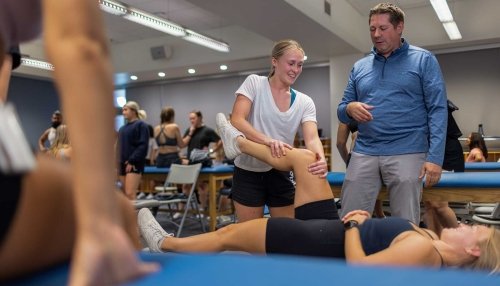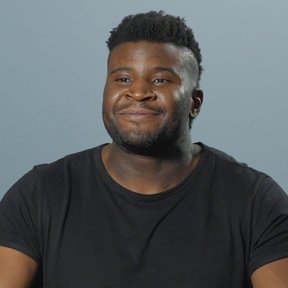The Midwestern University Physical Therapy Program aims to educate students to become highly skilled physical therapists who make meaningful contributions to healthcare through academic excellence and community service.
Healthcare Team
We prepare students to excel as versatile healthcare team members and contribute to functional improvement and care coordination. Our PT graduates are prepared to make lasting contributions through leadership, health promotion, and interdisciplinary cooperation in education, practice, and research.
Interprofessional Collaboration
Students collaborate with faculty to nurture vital clinical and lifelong learning skills, fostering a collaborative environment for individuals from diverse healthcare backgrounds. Our students actively collaborate with their fellow Midwestern healthcare students to foster interdisciplinary teamwork.
Clinical Experience
In the third academic year, you'll delve into four quarters featuring 55 course credits. This includes two invaluable clinical practica, where you'll accumulate 800 clock-hours of hands-on clinical education. These enriching experiences occur in diverse facilities across the continental United States, all governed by legal agreements with our University.
Clinical placements can include: Community, Urban, Rural, Teaching Hospitals, Rehabilitation Centers; Geriatrics; Pediatrics; Orthopedics/Sports Medicine Clinics; Schools; Oncology Centers; Women's/Men's Health Practices
Ready for Practice
Our program offers a comprehensive 34-month curriculum leading to a Doctor of Physical Therapy degree. We prepare students to excel as versatile healthcare team members and contribute to functional improvement and care coordination.
Learn More
Learn more about the requirements and find quick links to relevant catalog content to guide you in your application process.
- Bachelor's degree
- Minimum science GPA of 2.9 and cumulative GPA of 3.0
- Successful completion of prerequisite courses
View full list of requirements in the catalog*
*Subject to change
The College of Health Sciences Physical Therapy Program considers for admission those students who possess the academic and professional promise necessary for development as competent, caring members of the healthcare community. To select these candidates, a competitive admissions framework has been established. Within this competitive admissions framework, multiple criteria are used to select the most qualified candidates from an applicant pool that exceeds the number of seats available.
The Midwestern University Physical Therapy Program uses the Centralized Application Service for Physical Therapy Schools (PTCAS) for students applying to the Program. All applicants to the Physical Therapy Program are required to submit their applications to PTCAS with all required materials by April 15, 2025. Please refer to the PTCAS website for instructions on submission of PTCAS application materials.
The Physical Therapy program operates on a rolling admissions basis in which completed applications are reviewed throughout the admissions cycle to determine applicant eligibility for interviews. Interviews are typically conducted during the winter and spring. Admission decisions are generally made within one month of the interview.
Admissions information - catalog*
*Subject to change
- Applicants for all PT program pathways are required to submit their applications to PTCAS by April 15, 2025. The Midwestern Physical Therapy Program has one PTCAS application for all applicants, with options for applicants to select the pathway to which they would like to apply (residential, hybrid, or both).
- The PTCAS application submission site opens on June 15th. Please refer to the PTCAS application instructions for specific details about completing the application, required documents, and processing time. Applicants seeking admission into the hybrid pathway must complete the supplemental hybrid questions on the PTCAS application.
- Applicants are strongly encouraged to apply early as completed applications are reviewed on a rolling basis from August through February.
View catalog for more information*
*Subject to change
Mission
The mission of the Midwestern University Physical Therapy Program is to educate students, using the highest standards of academic excellence, to become physical therapists who practice across the healthcare continuum, making meaningful contributions to their patients, community, and profession.
Vision
The Midwestern University Physical Therapy Program will provide an environment which supports students and faculty to:
- Promote and optimize movement and function
- Maximize activity and participation of individuals
- Promote health and wellness
- Maintain an ethical framework for practice
- Support professional development of students, staff and faculty
- Acquire, appraise and apply current, best basic science, applied science and professional knowledge for making practice decisions
- Engage in scholarly activity and disseminate scholarly products
- Embrace cultural and social diversity in the academic community, healthcare community, and community-at-large
- Practice as collaborative members of the health community
Goals
Graduates will:
- Practice independent competent physical therapy.
- Demonstrate appropriate professional behavior.
- Contribute to and advocate for the health and wellness of society through education, consultation, and community outreach.
- Access, utilize, and contribute to the scientific literature for clinical decision-making.
Downers Grove Campus - 2024
- 472 applications
- 40% (190/472) of applicants were accepted
- 12% (57/472) of applicants were matriculated into the PT Program
Reported by the Federation of State Boards in Physical Therapy for MWU graduates
NPTE First time pass rate (averaged over the past 2 years - 2023 & 2024) - 89.5%
- First time pass rate for 2024 - 95.8%
- First time pass rate for 2023 - 83.3%
Ultimate pass rate (averaged over the past 2 years - 2023 & 2024) - 98.8%
- Ultimate pass rate for 2024 - 100.0%
- Ultimate pass rate for 2023 - 97.6%
*2-year average (class of 2023 and 2024) = 91.8%
- The class of 2023 had a graduation rate of 89.4%
- The class of 2024 had a graduation rate of 94.2%
As a physical therapist, you are trained to diagnose and treat individuals of all ages who have medical problems or other health-related conditions that limit their abilities to move and perform functional activities in their daily lives. You examine each individual and develop a treatment plan that helps restore function, improve mobility, relieve pain, and prevent or limit permanent disabilities for patients suffering from injuries or disease. You'll also help restore, maintain, and promote overall fitness and health through wellness-oriented programs that develop more active lifestyles.
Your education in physical therapy starts with basic science courses such as biology, chemistry, and physics, and then introduces specialized courses, including biomechanics, neuroanatomy, human growth and development, manifestations of disease, examination techniques, and therapeutic procedures. In addition to classroom and laboratory instruction, you'll receive supervised clinical experience where you examine patients' medical histories and then test and measure strength, range of motion, balance and coordination, posture, muscle performance, respiration, and motor function. Your treatment plan identifies appropriate exercises that encourage patients to use their muscles and increase capacity and endurance in these areas.
Pre-professional education should include courses in anatomy, biology, chemistry, social science, mathematics, and physics. Experience as a volunteer in the physical therapy department of a hospital, clinic, or with a high school athletic trainer will benefit your application to physical therapy educational programs. Strong interpersonal skills will help you educate your patients about physical therapy treatments, better communicate with patients' families, and provide compassionate treatment.
All states require physical therapists to pass national and state examinations and be licensed in the state of practice. An important member of the health care team, you'll provide your knowledge of physical therapy in consultation with other professionals such as physicians, dentists, nurses, educators, social workers, occupational therapists, speech-language pathologists, and audiologists. Some PTs treat a wide range of ailments; others specialize in areas such as pediatrics, geriatrics, sports medicine, neurology, or cardiopulmonary physical therapy.
Nearly 60 percent of physical therapists work in hospitals, clinics, or private practice. You may also be employed in home healthcare, nursing care facilities, outpatient care centers, physician offices, rehabilitation centers, adult day care programs, or schools. Physical therapists also teach in academic institutions and conduct research. The U.S. Bureau of Labor Statistics projects that employment in the field will grow 28 percent through 2026, much faster than average for all occupations. Demand will be spurred by increasing numbers of individuals with disabilities or limited function, chronic or debilitating conditions associated with aging, and children saved by technology but with severe birth defects, or people who must cope with the aftermath of trauma.
According to the American Physical Therapy Association (APTA):
With just a 0.2 percent unemployment rate, physical therapists are now experiencing the best employment conditions since the enactment of the Balanced Budget Act of 1997.
Physical therapists formed their first professional association in 1921, the American Women's Physical Therapeutic Association, led by Mary McMillan. By the end of the 1930s, both genders were admitted and membership grew to nearly 1,000 practitioners.
During the 1940s and 1950s, demand increased significantly for physical therapists to collaborate in treating the nationwide polio epidemic.
If you want to be the type of healthcare provider who sees a whole person rather than a symptom or illness; someone who gets to know your patients as people and wants to be involved in your community; someone who is compassionate, has a healing touch, and communicates well; and someone who enjoys knowing a diverse range of people from different backgrounds, a career in physical therapy may be just right for you.
Sources: American Physical Therapy Association; US Bureau of Labor Occupational Outlook Quarterly; ExploreHealthCareers.org
- Female 58%
- Male 42%
- Average age 23
- Average overall GPA: 3.57
- Class size: 57
- Top Home States: Illinois (68%), WI, MI
Doctor of Physical Therapy Program (IL) - Student financial fact sheet
100% (Classes of 2023 and 2024)
The Physical Therapy Program at Midwestern University, Downers Grove, IL is accredited by the Commission on Accreditation in Physical Therapy Education (CAPTE), 3030 Potomac Avenue, Suite 100, Alexandria, VA 22305-3085; telephone: 703-706-3245; e-mail: accreditation@apta.org; website: https://www.capteonline.org. If needing to contact the program/institution directly, please call 630-515-6462 or e-mail eliutk@midwestern.edu.
Midwestern University is accredited by The Higher Learning Commission/A Commission of the North Central Association of Colleges and Schools (HLC/NCA), 230 South LaSalle Street, Suite 7-500, Chicago, IL 60604-1413.
Academic Course Catalog
Explore details regarding your specific College/Program (subject to change).
Hear Our Stories
Tayler Ruppel, D.P.T., Physical Therapy, Class of 2025
“I am a first-generation college student for both undergraduate and graduate studies, and receiving a doctorate in physical therapy feels like such an accomplishment for both my family and me.”

Odell Miller, D.P.T., Physical Therapy, Class of 2023
"I want to live the life of movement is medicine."
Joseph J Krzak, PT, Ph.D., PCS Professor, Physical Therapy Program
"We’re not complacent with just checking the boxes. We want to provide the best quality education that we can provide."



